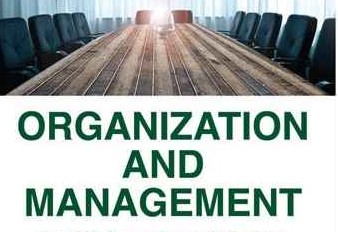
BUSINESS ORGANIZATION AND MANAGEMENT - BSE 1B
This course is designed to familiarize the students with the basic concepts, principles, and processes related to business organization, and the functional areas of management. Particular emphasis will be given to the study of management functions like planning, organizing, leading, and controlling, and orient the students on the importance of these functions and the role of each area in entrepreneurship.

Agribusiness BSE 3A
This course introduces the fundamental concepts of agriculture business within the framework of how agriculture industry operates and functions in local and global economy. The course provides an overview of the economic theories associated with the production, consumption and marketing of agricultural products as well as the policies designed to achieve efficiency and overall goals in agriculture.

Strategic Management for BSE3A
This course is an introduction to the field of Strategic Management. It covers the key concepts and theories in the field and how they can be
applied to real business situations. The main objective is to learn how to formulate and implement successful strategies that grant
competitive advantage to a firm, where a strategy is a plan that guides managerial decisions. Theoretical background is founded on the
“resource-based view” of the firm and its complementarity to microeconomic theory, game theory and organizational theory.
Business Law and Taxation (BSE3A)
The
purpose of this course is to enhance the abilities and understanding of
students in areas connected to business contracts. Additionally, it aims to
improve the learner's comprehension of the regulations required for various
transactions. This course introduces and help the student
comprehend basic knowledge, principles, legal terminologies, rights and
remedies of an aggrieved party and liabilities against a responsible party in a
civil obligation entered into through contract or otherwise. Furthermore, basic
principles on taxation is covered under this course subject.

Entrepreneurial Behavior and Mindset - BSE 1C
This course introduces the fundamentals of entrepreneurship that deals with the role of entrepreneurship in economic development. Topics on Filipino entrepreneurial economy, entrepreneurial motivation, government assistance and programs for entrepreneurs, development and growth theories and applications are included. Relevant topic such as business concepts and models, social responsibility, franchising as well as e-commerce in the Philippine setting shall also be discussed.

HUMAN RESOURCE MANAGEMENT FOR BS ENTREP 2-B
This course examines the role of the human
resource professional as a strategic partner in managing today’s organizations.
Key functions such as recruitment, selection, development, appraisal,
retention, compensation, and labor relations are examined. Implications of
legal and global environments are appraised and current issues such as
diversity training, sexual harassment policies, and rising benefit costs are
analyzed. Best practices of employers of choice are considered.

EVENTS MANAGEMENT
Events are globally important in social and
economic terms, are increasingly viewed as an essential sector of tourism, and
are crucial in destination marketing.
There are many cities that target the events sector and many venues where
events are produced. This course therefore provides a comprehensive overview
of events management, covering all types of event
destinations, venues and operations. Specific
attention is paid to the analysis, management
and monitoring of the economic and tourism benefits
of the events sector.

HUMAN BEHAVIOR IN ORGANIZATION - BSE 2B
The course introduces the students to
the factors affecting the behavior of individuals and groups in organization
focusing on the specific factors that tend to explain behavior of individuals,
groups, and organizations. Various
theories and models of organizational behavior, work group behavior, motivation
in life and work, and human relations among others are discussed and related to
organizational practices and phenomena

TECEN1 Technopreneurship
The course includes the journey into the world of entrepreneurship with
introspection of a business idea into a viable venture. The focus is on
unleashing the entrepreneurial spirit in each individual.

HUMAN RESOURCE MANAGEMENT FOR BS ENTREP 2-A
This
course examines the role of the human resource professional as a strategic
partner in managing today’s organizations. Key functions such as recruitment,
selection, development, appraisal, retention, compensation, and labor relations
are examined. Implications of legal and global environments are appraised and
current issues such as diversity training, sexual harassment policies, and
rising benefit costs are analyzed. Best practices of employers of choice are
considered.

Entrepreneurial Behavior and Mindset - BSE 1B
This course introduces the fundamentals of entrepreneurship that deals with the role of entrepreneurship in economic development. Topics on Filipino entrepreneurial economy, entrepreneurial motivation, government assistance and programs for entrepreneurs, development and growth theories and applications are included. Relevant topic such as business concepts and models, social responsibility, franchising as well as e-commerce in the Philippine setting shall also be discussed.

PROGRAM AND POLICIES TO ENTREPRENEUR DEVELOPMENT
This course will
enable students to understand the various facets of development of an
enterprise. It will provide students with experiential learning opportunities
in order to acquire the relevant knowledge and skills in running and growing a
new business. The course will introduce
the various stages with the focus on the early phases of its life cycle and
factors that contribute to its survival.

CONVENTION AND MEETING MANAGEMENT
The course serves as a comprehensive overview of the Meetings, Exhibitions and Conventions (MEC) industry. MEC is unquestionably one of the fastest growing segments of hospitality, and incredibly exciting and dynamic because of a variety of occasions. This course has been designed to provide students with contemporary knowledge and understanding of concepts, management, challenges, and trends associated with the industry. This course provides a comprehensive approach to managing and planning large meetings, events, conferences, and conventions management with Students will achieve a macro working knowledge of MEC industry principles, practices, operations and management.

INFORMATION TECHNOLOGY
The goal of this course focus on learning MS Office software applications including intermediate word processing, spreadsheets, and presentation graphics using a case study approach where critical thinking and problem solving skills are required. Computer concepts are integrated throughout the course to provide an understanding of the basics of computing, the latest technological advances and how they are used in industry. Ethics and issues encountered in business are discussed to challenge students on societal impact of technology.

FOREIGN LANGUAGE
This course Foreign Language (NIHONGO) aims to teach the student with Japanese Language and Culture by Basic Greetings, Self Introduction, how to read and write Hiragana, Katakana, and Kanji as the handwriting system used by the Japanese, they will learn also how to create sentences, grammar, and conversation it includes also Numbers, time, currency, General counting's in Japanese, by learning all of these they will have the knowledge in writing, speaking and listening like a native Japanese Speaker. Students will have an advantage in their career by studying this course this will served also as their foundation to take the Japanese Language Proficiency Test N5 Level as one of the requirements to Study or Work in Japan.

BSE 1A - SELF TESTING ACTIVITIES
This course covers basic movements skills needed in the performance of stunts and tumbling and other physical exercises based on scientific principles for the improvement and maintenance of high-level physical fitness.

